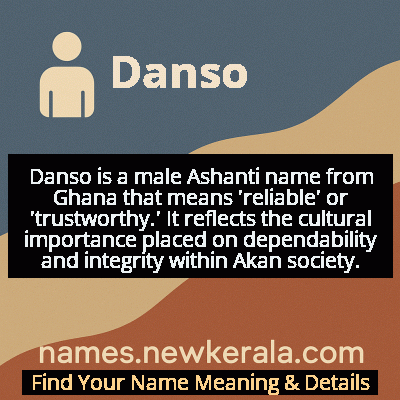Danso Name Meaning & Details
Origin, Popularity, Numerology Analysis & Name Meaning of Danso
Discover the origin, meaning, and cultural significance of the name DANSO. Delve into its historical roots and explore the lasting impact it has had on communities and traditions.
Name
Danso
Gender
Male
Origin
African
Lucky Number
8
Meaning of the Name - Danso
Danso is a male Ashanti name from Ghana that means 'reliable' or 'trustworthy.' It reflects the cultural importance placed on dependability and integrity within Akan society.
Danso - Complete Numerology Analysis
Your Numerology Number
Based on Pythagorean Numerology System
Ruling Planet
Saturn
Positive Nature
Ambitious, efficient, realistic, and authoritative.
Negative Traits
Materialistic, stressed, confrontational, and can be overly ambitious.
Lucky Colours
Dark blue, black.
Lucky Days
Saturday.
Lucky Stones
Blue sapphire, amethyst.
Harmony Numbers
2, 4, 6.
Best Suited Professions
Business leaders, managers, financial services, law enforcement.
What People Like About You
Leadership, determination, organizational skills.
Famous People Named Danso
Danso Abiam
Traditional Chief
Renowned Ashanti elder known for mediating tribal disputes and maintaining peace
Kwame Danso
Educator
Pioneering Ghanaian teacher who established rural schools in the Ashanti Region
Danso Boakye
Musician
Ghanaian highlife musician preserving traditional Ashanti musical traditions
Yaw Danso
Business Leader
Successful entrepreneur known for ethical business practices in Kumasi
Name Variations & International Equivalents
Click on blue names to explore their detailed meanings. Gray names with will be available soon.
Cultural & Historical Significance
Extended Personality Analysis
People named Danso typically exhibit a constellation of personality traits centered around reliability and trustworthiness. They are often perceived as the 'rock' in their social and professional circles - individuals who remain calm under pressure and follow through on their promises regardless of circumstances. Their thinking tends to be systematic and deliberate, with a strong aversion to impulsivity that makes them excellent planners and strategists. Danso personalities usually demonstrate exceptional loyalty in relationships, often maintaining childhood friendships and family connections throughout their lives. They possess a strong sense of duty and responsibility, frequently putting others' needs before their own. While sometimes perceived as reserved or cautious, this stems from their careful nature rather than shyness. Their consistency makes them excellent in roles requiring long-term commitment and steady progress. However, they may need to guard against becoming too rigid or resistant to spontaneity. Overall, the Danso personality represents the ideal of steadfast reliability that forms the bedrock of strong families and communities.
Modern Usage & Popularity
In contemporary usage, Danso maintains its cultural authenticity while adapting to modern global contexts. The name continues to be predominantly used within Ghanaian communities, with particular strength in the Ashanti Region where traditional naming practices remain vibrant. Among the Ghanaian diaspora in Europe and North America, Danso has gained recognition as a meaningful cultural name that preserves heritage while being relatively easy to pronounce internationally. Recent naming trends show that educated, middle-class Ghanaian parents are increasingly choosing traditional names like Danso to counter Western naming influences and reinforce cultural identity. While not appearing on most global popularity charts, the name enjoys consistent usage that reflects its specialized cultural role rather than mass appeal. Social media and global connectivity have also helped raise awareness of the name beyond Ghanaian circles, with some non-Ghanaians adopting it for its strong, positive meaning and cultural richness.
Symbolic & Spiritual Meanings
Symbolically, Danso represents the enduring foundations upon which lasting relationships and communities are built. It embodies the metaphorical concept of being as unwavering as the ancient mountains of Ghana - providing stability, shelter, and orientation for others. The name carries deep symbolic resonance with the Ashanti golden stool, representing something of immense value that can be completely trusted and relied upon. In broader symbolic terms, Danso evokes the image of a deep-rooted tree that withstands storms while providing shade and protection - suggesting both resilience and nurturing qualities. It also symbolizes the traditional Ashanti concept of 'abusua' (family/clan) continuity, representing the reliable link between past, present, and future generations. The name metaphorically suggests a well-constructed bridge - something that safely carries people across difficult passages through its structural integrity and dependability.

